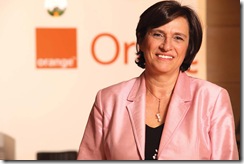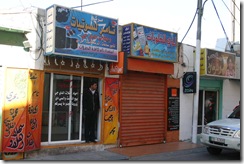On July 1, Nayla Khawam became CEO of Jordan Telecom Group Orange. Her predecessor, Mickael Ghossein was instrumental in transforming the incumbent from a stodgy government utility into a commercial integrated company, and Khawam’s early focus will likely be on driving the gains from integration. Jordan is a notoriously competitive market and part of Khawam’s mandate is to continue to differentiate Jordan Telecom’s services, and make the telco an operator of reference
Nayla Khawam is a France Telecom veteran whose eye for detail will likely see her focussiong her efforts on the further improvement of the overall Orange experience
Differentiation is a challenging thing to achieve in a market as congested as Jordan’s telecoms landscape, what with its scores of operating licences ranging from GSM to WiMAX and alternative data providers. Thus, the award of the country’s first 3Glicence to Jordan Telecom Group (JTG) in August, with its hugely beneficial exclusivity clause, marks Nayla Khawam’s first significant opportunity to offer a service that is clearly different to what is already on the market, and thereby help create a certain level of additional brand loyalty.
JTG agreed to pay JD 50 million (US$70 million) for the concession, in a process to award spectrum that has dragged on for close to three years. The telco expects to spend a similar amount in the first instance rolling out the network to potentially high data usage centres around the country.
“JD 50 million is a package deal price,” Khawam explained to Comm. “So we pay this amount but receive concessions, which is what we had always asked for. Notably on the frequency and evacuation fees and we are hoping not to pay revenue share on Internet applications. This is a good thing for us as well as the country as it promotes Internet penetration in Jordan,” she added.
JTG has been given a 12-month exclusivity period commencing on the date of commercial launch, with this date having to be a maximum six months after the telco submitted its bid. As this was done mid-August, the expectation is that JTG will look to commercialise service by the middle of February 2010.
No bid bond was instituted, which is typically linked to the requirement to meet a launch date, though a real commercial penalty may exist should JTG not meet its February launch schedule. The exclusivity period is set to commence counting down from the middle of February 2010 irregardless of whether the operator launches or not. That is to say, should it launch later, it would face a shorter period of exclusivity in which to establish its 3Gofferings.
France Telecom has launched as many 35 3Gnetworks over the years, and falling under this banner offers JTG a real advantage with respect to optimising the network it deploys, what services to offer, and how to bring them to market.
“It is very important to be exclusive, and to be frank we believed it was a crucial element in our decision to bid for the licence,” Khawam stated. “We think the way other technologies such as WiMAX have been launched in this region may not necessarily be the right way. Having multiple potential players licensed at the same time is too many, and their various offers could lead to confusion amongst customers.”
The fact that certain WiMAX operators have been describing their networks as ‘4G’ is a matter that niggles at JTG management given their preference to manage expectations of the performance of various transport technologies.
“Exclusivity is important because it gives us time to show what we can really do with 3G,” asserted Khawam. “My real focus as the new CEO is an emphasis on quality across all our products and services. Now is the time to reinforce the transformation/integration process, and differentiate ourselves through quality,” she added.
Khawam is well equipped to drive quality to the core of JTG’s efforts given the senior positions she has held working for France Telecom in France. Her last position prior to leaving JTG’s parent company was area director of the Paris region, a position which placed her in charge of commercial and technical departments for mass market and business clients.
Khawam has also had experience in planning networks and customer service, meaning she has a good understanding of the provision of quality across the entire end-user experience.
“Khawam has a stated goal to make Orange Jordan the operator of reference and she really wants someone to refer to Orange when he thinks about an operator that serves its clients well,” commented Philippe Vogeleer, chief strategy officer of JTG. “We need to use the segmentation we have to know our customers better, to look at each of the elements that make an Orange experience an important experience and consider these experiences altogether as opposed to separately as we used to do,” he added.
Thus Khawam is looking to align the entire customer journey, which is still follows a product-by-product approach at JTG at this point in time. “She’s bringing a wealth of quality experience, and is very strongly focussed on the total customer experience,” Vogeleer said.
“We are a company that serves every consumer in Jordan and we don’t really make any distinctions. We don’t have a snobbish touch or a blue collar touch. We serve everyone, but that does not mean we are perfect. We need to find the packages that will talk to people,” Vogeleer added.
Khawam takes over JTG when the telco is very definitely enjoying a period of ascendancy. In 2008 it recorded revenues of JD 401 million, the highest in the company’s history, and profit of more than JD 100 million, again marking an all time high. Maintaining this positive momentum will be an obvious challenge for Khawam, and JTG appears willing to continue innovating its business model in order to do so.
About two years ago Friendi Mobile and i2 were awarded licences to offer MVNO services in Jordan. However, it quickly became evident that none of the three GSM incumbents were looking to engage in detailed negotiations with either of the MVNO licensees for the meantime. While a collusive hint might have initially existed in the network operators’ refusal to enter serious discussions with the MVNO licensees, Telecommunications Regulatory Commission (TRC) guidelines requiring the network operators to treat every potential MVNO partner equally, did not help the plight of the virtual parties.
JTG’s position on the matter, however, appears to be softening. The telco has always stated that it would be in support of MVNOs provided such a partners are able to demonstrate that they have a strategy to help the network operator perform better in a market segment that it may not be doing as well as it would like to.
According to Vogeleer there is an MVNO that has been able to make such a case for itself and JTG is in advanced discussions with it as JTG’s management believes the prospective MVNO has something to offer. Vogeleer is of the opinion that these people have a story to tell and he can see they have done their homework, as has JTG with respect to the sectors it is servicing well and the ones it could do with some improvement.
“Some MVNOs have launched services in the region, and a great deal of experience has been learnt from it, allowing mobile operators like us to see in a concrete way the benefits of tying up with an MVNO,” Vogeleer revealed. “We saw one MVNO entering an agreement that targeted Indians in Oman and the MVNO was successful because it had the correct distribution method, establishing a call centre that speaks Hindi and not English,” Vogeleer said. “Frankly we don’t have time to develop these things in-house and there is potential for these niches.”
JTG has been in the process of transforming from a state-run operator into a commercially responsive telecom provider in a highly competitive market
While Vogeleer is negotiating with the prospective MVNO under a non-disclosure agreement and is thus unable to reveal the party in question or the nature of their negotiations, a simple process of elimination points to Friendi Group, the MVNO that in July announced the launch of a programme called Reach Out, which was the first building block in the player’s strategy to provide Friendi Mobile customers in Oman and those out of the country with competitive mobile international call rates.
The first phase of the Reach Out programme was the launch of a partnership between Friendi Group and Idea Cellular of India. Friendi Mobile customers in Oman are able to call Idea subscribers in Kerala at rate as low as 139 Bz (US$0.36) per minute, the lowest international mobile call rate from any mobile provider in Oman to India. Idea subscribers in Kerala will also benefit from a reduced rate when calling Friendi Mobile customers in Oman, with all calls charged at INR9.19 (US$0.19) per minute.
“Deep knowledge of expat populations is something that the MVNO might be able to help us with,” Vogeleer acknowledged.
“All the parties involved know that the idea of dealing with one MVNO opening us up to having to deal with many is not acceptable. I don’t know yet how this will be resolved. The ball is as much in the TRC’s court as ours. If the regulator wants more competition it is for them to give us guarantees about the way in which we are able to work with MVNOs and not have these conditions imposed upon us,” Vogeleer said.
Looking beyond Jordan’s borders, under Khawam JTG will continue to have an appetite for regional investment, but will maintain the same pragmatic approach to such activities as it has done in the past. Under Ghossein and Laurent Mialet before him, Jordan Telecom, with France Telecom’s blessing mapped out the Middle East as its investment interest area, though over the last three years little significant activity has come of it.
JTG owns a stake in Bahraini alternative data provider Lightspeed Communications and has a similar investment in Lebanon, having made no meaty investments in the region.
“The Lightspeed acquisition was good way for us to learn how to invest in the Gulf .We did the same in Lebanon, through a support agreement with Sodetel, a local telecom operator, and in Bahrain in particular we have faced significant hurdles,” conceded Khawam. “We have learnt that some markets are not always liberalised, even the ones that claim to be. So we are looking at potential partners to merge with in Bahrain as we believe in the future we will see a more limited number of operators in that market with larger size,” she added.
And just because JTG has not made a sizeable investment in the region does not mean the telco is not interested. It reviews three or four opportunities seriously every year, with the operator remaining the Middle East hub for France Telecom. Thus management at the Jordanian operator would like to think it is pragmatism that has prevented it from participating in the region’s M&A activity rather than a lack of will.
“In the last two years JTG has studied the business case for two incumbents. We also considered greenfield licence bids in Bahrain and Kuwait, but at the prices that were being offered decided not to participate further in them,” Khawam said.
She continues to relish the opportunity.





0 comments ↓
There are no comments yet...Kick things off by filling out the form below.
Leave a Comment